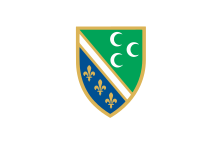 Flag of Bosniak minority in Montenegro | |
| Total population | |
|---|---|
| 53,605 (2011 census)[1] | |
| Regions with significant populations | |
| Rožaje Municipality (83.91%) Petnjica Municipality (83.02%) Plav Municipality (51.90%) Gusinje Municipality(42.64%) Bijelo Polje Municipality (27.34%) Berane Municipality (17.72%) Tuzi Municipality (9.23%) | |
| Languages | |
| Bosnian, Montenegrin | |
| Religion | |
| Sunni Islam | |
| Related ethnic groups | |
| Other South Slavs |
Bosniaks are an ethnic minority in Montenegro, first introduced in the 2003 census. According to the last census from 2011, the total number of Bosniaks in Montenegro was 53,605 or 8.6% of the population. Bosniaks are the third largest ethnic group in the country, after Montenegrins and Serbs.
YouTube Encyclopedic
-
1/2Views:25 3412 336
-
Croatia vs Slovenia vs Bosnia vs Serbia vs Montenegro vs North Macedonia - Country Comparison
-
Bosnia and Herzegovina v. Serbia and Montenegro [2007] – PS3201 presentation
Transcription
Demographics


Bosniaks primarily live in the Sandžak area of northern Montenegro, and form the majority of the population in four municipalities: Rožaje (83.91%), Petnjica (83.02%), Plav (56%) and Gusinje (42.64%).
Politics
- The main political party of Bosniaks is the Bosniak Party (BS), led by Ervin Ibrahimović. The party currently has three seats in Parliament of Montenegro.
- There is also the Justice and Reconciliation Party in Montenegro (SPP u Crnoj Gori), led by Hazbija Kalač.
The majority of Bosniaks of Montenegro were in favor of Montenegrin independence during the independence referendum in 2006.
Dialect
The BCMS dialects of Gusinje and Plav show a very high structural influence from Albanian. Its uniqueness in terms of language contact between Albanian and BCMS is explained by the fact that most BCMS speakers there are of Albanian origin.[2]
Religion
Today, the majority of Bosniaks are predominantly Sunni Muslim and adhere to the Hanafi school of thought/jurisprudence, the largest and oldest school of jurisprudence within Sunni Islam.
Notable people
Notable Bosniaks from Montenegro, past and present, include:
Film
- Izudin Bajrović, actor
- Moamer Kasumović, actor and producer
Music
- Danijel Alibabić, singer
- Senida Hajdarpašić, singer
- Dado Polumenta, singer
- Šako Polumenta, singer
- Ekrem Jevrić, singer
Literature
- Sait Orahovac, writer
Science
- Šerbo Rastoder, historian
Politics
- Hüseyin Pasha Boljanić, Ottoman statesman and government official
- Rifat Rastoder, politician, writer and journalist
- Rafet Husović, politician
- Selmo Cikotić, Bosnian politician
- Ervin Ibrahimović, politician
- Mevludin Nuhodžić, politician
- Seid Hadžić, politician
Entrepreneurs
- Fahrudin Radončić, entrepreneur and politician
Sports
- Refik Šabanadžović, former footballer
- Sead Šehović, basketball player
- Suad Šehović, basketball player
- Elsad Zverotić, footballer
- Damir Čakar, former footballer
- Sead Kolašinac, footballer
- Dženan Pejčinović, footballer
- Dženan Radončić, former footballer
- Sead Hakšabanović, footballer
- Mirsad Huseinović, former footballer in the U.S.
- Majda Mehmedović, handball player
- Fuad Muzurović, former Bosnian footballer
- Ajsel Kujović, former Swedish footballer
- Emir Kujović, Swedish footballer
- Dino Radončić, basketball player
- Elsad Zverotić, former footballer
- Derviš Hadžiosmanović, football coach and former player
- Arian Sadiković, kickboxer
- Refik Šabanadžović, former footballer
- Anel Šabanadžović, footballer
- Emir Spahić, footballer
- Izet Hajrović, footballer
- Emir Azemović, footballer
- Armin Bošnjak, footballer
- Tarik Hadžić, alpine skier
- Sead Hajrović, footballer
- Alma Hasanić Grizović, handball player
- Ferid Idrizović, former footballer
- Dino Islamović, footballer
- Emrah Klimenta, footballer
- Edvin Muratović, footballer
- Fuad Muzurović, football manager and former player
- Adnan Orahovac, footballer
- Dženan Radončić, footballer
- Ermin Seratlić, footballer
- Aldin Skenderović, footballer
- Dževad Turković, footballer
- Elsad Zverotić, footballer
Religion
- Hafiz Abdurahman Kujević, professor at IU Novi Pazar and W madrasa
- Sead Nasufović, Bosniak Islamic cleric and Grand Mufti (Reis ul-Ulema) of Serbia
Other
- Sabiha Gökçen, aviator
- Sinan Bey Boljanić, sanjak-bey
- Hersekzade Ahmed Pasha, Ottoman statesman and navy's grand admiral
- Osman Rastoder, commander of the Muslim militia
See also
References
- ^ Montenegro#Demographics
- ^ Matthew C., Curtis (2012). Slavic-Albanian Language Contact, Convergence, and Coexistence. The Ohio State University. p. 140.

